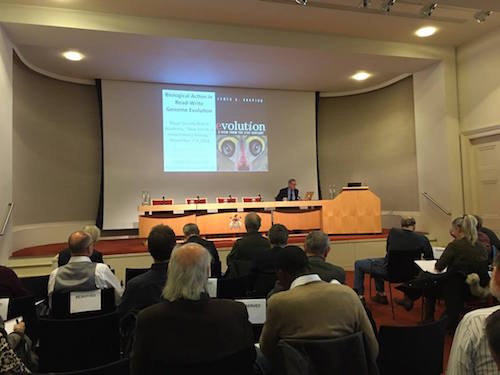 Evolution
Evolution
 Intelligent Design
Intelligent Design
London Guardian Acknowledges the Irony of Excluding ID Advocates from the Royal Society Meeting

Writing in the London Guardian, University of Warwick sociologist Steve Fuller takes note of last week’s Royal Society meeting and its exclusion of intelligent-design advocates:
The Royal Society and British Academy recently held a high-profile interdisciplinary conference on ‘New Trends in Evolutionary Biology’. Officially, the event was open to the widest possible range of criticisms of the Neo-Darwinian synthesis. Yet the invitation did not extend to proponents of intelligent design theory who have publicized most of the same criticisms of the synthesis. It would seem that the paradigm shift demanded by advocates of intelligent design would have been a step too far.
As Paul Nelson and I wrote the other day over at CNSNews, the conference confirmed what ID scholars (Stephen Meyer and others) have said for years: that biology is riven with debate over evolution, something that Darwin’s cheerleaders deny and paper over so the public won’t notice. Fuller brings out another point, the irony that even as the meeting sought to air differences on Darwinism, albeit in a safe space hidden from prying eyes, it also silenced ID theorists who echo many of the criticisms of the orthodox synthesis advanced by participants in the conference.
Fuller’s theme is what he calls “post-truth” (“Science has always been a bit ‘post-truth’“). He refers to the Kuhnian idea that scientific revolutions are sociological phenomena as much as, or more than, they are scientific ones:
What makes Kuhn’s account of science ‘post-truth’ is that truth is no longer the arbiter of legitimate power but rather the mask of legitimacy that is worn by everyone in pursuit of power. Truth is just one more — albeit perhaps the most important — resource in a power game without end. In this respect, science differs from politics only in that the masks of its players rarely drop.
The explanation for what happens behind the masks lies in the work of the Italian political economist Vilfredo Pareto (1848-1923), devotee of Machiavelli, admired by Mussolini and one of sociology’s forgotten founders. Kuhn spent his formative years at Harvard in the late 1930s when the local kingmaker, biochemist Lawrence Henderson, not only taught the first history of science courses but also convened an interdisciplinary ‘Pareto Circle’ to get the university’s rising stars acquainted with the person he regarded as Marx’s only true rival.
For Pareto, what passes for social order is the result of the interplay of two sorts of elites, which he called, following Machiavelli, ‘lions’ and ‘foxes’. The lions acquire legitimacy from tradition, which in science is based on expertise rather than lineage or custom. Yet, like these earlier forms of legitimacy, expertise derives its authority from the cumulative weight of intergenerational experience. This is exactly what Kuhn meant by a ‘paradigm’ in science — a set of conventions by which knowledge builds in an orderly fashion to complete a certain world-view established by a founding figure — say, Newton or Darwin. Each new piece of knowledge is anointed by a process of ‘peer review’.
As in [Orwell’s] 1984, the lions normally dictate the historical narrative. But on the cutting room floor lies the activities of the other set of elites, the foxes. In today’s politics of science, they are known by a variety of names, ranging from ‘mavericks’ to ‘social constructivists’ to ‘pseudoscientists’. Foxes are characterised by dissent and unrest, thriving in a world of openness and opportunity.
The image of lions and foxes is spot on. The problem with the “post-truth” label, however, is that it seems to imply that neither “lions” nor “foxes” are really interested in finding out the truth, but rather in maintaining or obtaining power or prestige. But from the insight that science takes place against a largely unacknowledged backdrop of “political” striving, I don’t think that necessarily follows.
Lions have a strong personal stake in maintaining the status quo, but their tradition may nevertheless be a bearer of deep truth, or it may not; and they may sincerely care about that truth. By the same token, foxes have an interest in grabbing the limelight, but that doesn’t mean they are mere cynical manipulators either.
The sociological view, itself perhaps a shade too cynical in this instance, should be borne in mind. But it must not hide from view the possibility that a genuine quest for truth is going on before our eyes.
Photo: James Shapiro, University of Chicago biologist, of “Third Way” fame.
